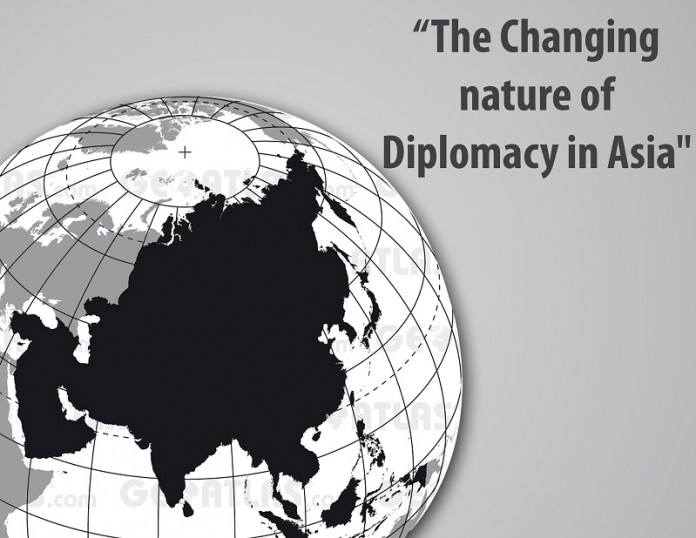Shifts in the global economy are altering the landscape of international diplomacy in significant and interesting ways. In Asia, we are seeing the emergence of new forms of cultural diplomacy, as India, China and various mid-tier countries jostle for regional influence. The idea of reviving the Silk Roads for the 21st century through the Belt and Road Initiative, for example, means history and culture are being refashioned to build trade and diplomatic relations across the region.
With its themes of bilateral cooperation in Tibetan ‘archaeology’, Kung Fu Yoga explored new ground as a diplomatic initiative attempting to reach vast audiences in both China and India. Its lack of success in India suggests the outcomes of such diplomacy remain unpredictable. What is certain however, is that culture is now among those areas, which governments in Asia view as a resource for building state-state and people-people ties beyond their territorial borders. Modi’s Yoga and Buddhism diplomacies are other notable examples of this fast-evolving soft-power landscape in the region.

Important Announcement – EasyShiksha has now started Online Internship Program “Ab India Sikhega Ghar Se”

Education has emerged as another key sector in which public diplomacy plays out in diverse forms. In the case of tertiary international students moving in unprecedented numbers around the world (approximately 5 million in 2016, a rise of 67% from ten years ago) this is clearly one aspect of ‘people-to-people’ diplomacy that governments shape with policy settings but also follow and react according to experiences and outcomes beyond their control. As India provides the second largest number of international students, after China, this realm is full of possibilities, depending on the government’s appetite for incentives that bring education closer to foreign policy objectives. For example, to what extent should the East-West dimension of Belt and Road and closer co-operation among Asian countries be matched by particular new education hubs, scholarships and exchanges fostering closer connections in a new regional manner?
But it remains unclear as to what extent is the Indian diaspora, so large and established in parts of Asia, North America, Australia and the UK, are active contributors to this landscape of Indian diplomacy today. Where Indians overseas are citizens of other countries this is of course a major factor to consider, but citizenship does not detract from the extraordinary levels of mobility – human, material capital, and ideas – flowing between countries in ways that impact on the national interests of several of them.
Top Courses in Software Engineering
But as countries across Asia respond to Belt and Road with varying degrees of enthusiasm, it is apparent that the ongoing presence of the more traditional forms of hard power mean those attempting to build cross-border relations in the cultural, educational or other sectors, remain entangled in a complex landscape of regional politics.
It is also worth asking, how do these new forms of diplomacy intersect with or moderate the resurgent nationalism; a feature of many countries in Asia and the Pacific? But while populist nationalism grows, so too, does the celebration of key moments or examples of transnationalism. One much loved example in New Delhi is the architectural genius and legacies of American Joseph Allen Stein, whose extraordinary environmental-aesthetic sensibility informed buildings such as the India International Centre, the India Habitat Centre and the Australian High Commissioner’s Residence.
It is clear areas such heritage and education are powerful and growing field of diplomacy and soft-power, but ones that are susceptible to the whims of governments and shifting regional alliances and rivalries. It is a landscape that will warrant careful and critical attention over the coming years.
– Authored by Professors David Lowe and Tim Winter
Empower your team. Lead the industry
Get a subscription to a library of online courses and digital learning tools for your organization with EasyShiksha
Request NowQ. Are EasyShiksha's internships truly free?
Yes, all internships offered by EasyShiksha are completely free of charge.
Q. How can I apply for an internship with EasyShiksha?
You can apply by visiting our website, browsing available internships, and following the application instructions provided.
Q. What types of internships are available through EasyShiksha?
EasyShiksha offers a wide range of internships across technology, business, marketing, healthcare, and more. Opportunities are continuously updated.
Q. Will I receive a certificate upon completing an internship?
Yes, upon successful completion, you will receive a certificate recognizing your participation and achievements.
Q. Are EasyShiksha's internship certificates recognized by universities and employers?
Yes, the certificates are recognized by universities, colleges, and employers worldwide.
Q. Is the download of certificates free or paid?
Access to internships and courses is free, but there is a small fee to download certificates, covering administrative costs.
Q. When can I start the course?
You can choose any course and start immediately without delay.
Q. What are the course and session timings?
These are fully online courses. You can learn at any time and pace. We recommend following a routine, but it depends on your schedule.
Q. What will happen when my course is over?
After completion, you will have lifetime access to the course for future reference.
Q. Can I download the notes and study material?
Yes, you can access and download course materials and have lifetime access for future reference.
Q. What software/tools would be needed for the course?
All necessary software/tools will be shared during the training as needed.
Q. I’m unable to make a payment. What should I do?
Try using a different card or account. If the problem persists, email us at info@easyshiksha.com.
Q. Do I get the certificate in hard copy?
No, only a soft copy is provided, which can be downloaded and printed if required.
Q. The payment got deducted but shows “failed”. What to do?
Technical errors may cause this. The deducted amount will be returned to your account in 7-10 working days.
Q. Payment was successful but dashboard shows ‘Buy Now’?
Sometimes payment reflection is delayed. If it takes longer than 30 minutes, email info@easyshiksha.com with the payment screenshot.
Q. What is the refund policy?
If you face technical issues, you can request a refund. No refunds are issued once the certificate has been generated.
Q. Can I enroll in a single course?
Yes, select the course of interest, fill in the details, make payment, and start learning. You will also earn a certificate.
Q. My questions are not listed above. I need further help.
Contact us at info@easyshiksha.com for further assistance.
ALSO READ: Role-technology-influencing-education-sector
Get Course: Project-Management-for-Beginners



































































